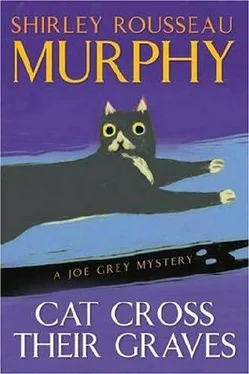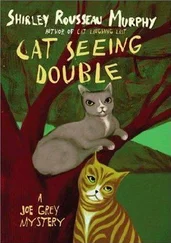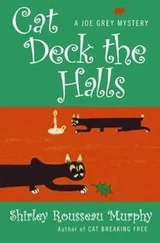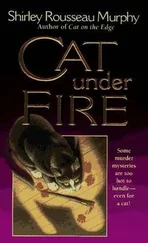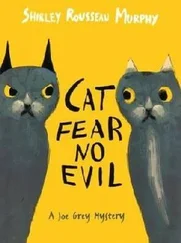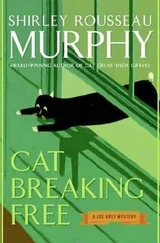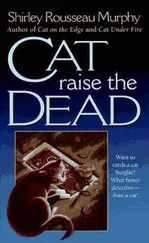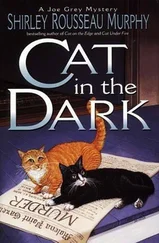Except, the cat had chewed nearly through the rope. When she twisted her arm back, the rope gave and flew apart. Swallowing, she jerked her arm free.
Quickly she got the ropes off, around her body, her legs. She was free. She jerked the handkerchief down from her face. Free! She could breathe! The cat stared up at her once and leaped from her lap and went straight to the door.
Lori didn't tell herself she was imagining anything. She slipped to the door shaking so much she could hardly grab the knob. So scared she thought she'd throw up. She turned the dead bolt real careful, turned the doorknob ever so slow, not to make a sound, and eased the door open.
The cat flew out between her feet, and Lori flew out after it. They were free. Free, together. Out in the cold black night free. She was certain, then, that the cat had been trapped in there, too.
Turning, silently she closed the door before the cold breath of night woke him. And they ran, away through the night, Lori on tiptoe on the gravelly rough walk, then faster when she hit the sidewalk. She ran straight back to the hills, but the cat swerved away in the other direction, seemed to know exactly where it wanted to go. How did you thank a cat, when it maybe saved your life? But, oh, she was free. Racing through the empty village and uphill in the cold night, running so hard she was warm, then sweating, she fled as fast as she could toward Genelle Yardley's house. She knew no other living person to go to. She couldn't go back to the library, he knew where she'd been, she was sure of it. She needed to be with someone, she needed a grown-up, bad. Running and running, she knew that what had happened was impossible. But that it had happened, that a cat had saved her, that a little cat had chewed her ropes and freed her.

In the black predawn that enfolded the village, Lori slowed her running at last. Her heart was pounding hard, but pounding, now, more from her wild flight than from fear. Down in the village behind her, the courthouse clock struck five-thirty, its chimes wavering like underwater in the gusting wind. She ached with hunger. Mama wouldn't have let her go out in the night without eating and without another sweater. Well, Mama wouldn't have let her go out at one o'clock in the morning. No way. Mama would say, "You went out alone in the middle of the night, and look what happened!" But all the same Mama would hold her tight and be thankful she was home.
Except, she wasn't home. She didn't have a home.
She tried not to think about what that man might have done to her, what he meant to do. She'd never heard, not from Mama, not from the kids in foster care, of someone asking school questions before they did bad things to you. Those foster-care people in Greenville, after Mama died, they hadn't told her nothing like that-but then, they hadn't told her anything straight. And then that one welfare woman, she took the money from Mama's purse, Lori saw her take it.
She'd still had almost ten dollars of her own, in her book bag, money that Mama gave her for an allowance. But then in that first home that was like a big jail, they took her book bag, too, and when they gave it back, her money was gone.
She'd pitched a fit, just like Mama would've done. And that made 'em mad, they said she had some kind of mental disorder and shut her in a room by herself for a week. Of course they didn't give her money back. It was five foster homes later that she told welfare she had a pa, and they put her on the plane and sent her home, had a welfare person meet her and take her home to Pa.
She'd been so excited that she'd be with Pa again; and it'd been nice at first, just her and Pa, but then he saw her talking to that man on the street, old Mr. Lummins from the shoe shop. Pa got real mad, told her not to talk to no one. Then he found out she had a man teacher that she liked and he kept asking her questions about him. She didn't know what was wrong with Pa, he started getting real strange again, like before she and Mama left.
When she was little, before she and Mama moved away, Mama was so pale and didn't talk much, and then they moved. Packed up Mama's car and drove for five days to North Carolina where Mama had a friend, Bonnie, they could stay with and Mama went to work in the library in Greenville. After that, Mama was happy, she started to smile again and have fun; they were happy there, just the two of them.
Dawn was coming, the sky getting lighter. She kept looking behind her and listening for his footsteps or the car. She hoped he was dead drunk, out like a light-or better, that he was dead. There was no one on the street. The wind hit hard against her back, pushing her so hard uphill she could almost lean against it. Lights were coming on in a few houses. She wondered how long she'd have to wait until Ms. Yardley woke up. Wondered if she could be rude and ask for something to eat. Maybe old women slept really late and she'd have to hide in the bushes forever.
Was she crazy to come up here and try to ask that old lady questions?
In the yard of a tan frame house, she could see a faucet beside the steps. Crossing to it, she drank from it, getting her shoes wet, then ran because maybe they'd hear water banging in the pipes and come out. She thought she'd never reach Genelle Yardley's number, but then at last there it was. She stood looking up at Ms. Yardley's tall old house. It was the color of pale butter, its walls covered with round shingles like fish scales.
Above the windows were fancy decorations like a fussy old lady wearing lace. Victorian, Mama would say. The house stood close to the street and close to the house on its left. Its yard seemed to be all on the right behind a high wall that was shingled like the house, with fancy stuff on top. Gingerbread. A Victorian house with fish-scale shingles and gingerbread, but not a storybook house. Just strange, and different. Stepping close to the wrought-iron gate, she peered in-and caught her breath.
A faint glow washed across the garden from little lights down low among the flowers, mushroom-shaped lights like houses for tiny people, maybe for The Borrowers. Maybe it was, after all, an enchanted place. She wanted to be in there. Safe, all safe like in The Secret Garden, behind its locked wall. Far at the back, she could make out pale round boulders lining a little dry streambed. Suddenly, looking in, she felt a ripple down her back, and she spun around.
But there was no one on the street or in the other yards. Well, she'd heard nothing; just a feeling. She could make out no one standing in shadow, no movement, but she was not comfortable there.
Moving quickly, she lifted the wrought-iron latch. She felt a surge of excitement that it wasn't locked. She slid inside, closing the gate behind her. Wishing she could lock it, she hurried down the stone walk between flowers and little trees. There were surprises everywhere, flowers among big boulders, benches tucked under the trees. A roofed stone terrace ran along the side of the house, and glass doors looked out on the garden. In one, a light shone. Did Ms. Yardley keep the light on all night? Maybe because she wasn't well? When Mama was so sick, she didn't sleep much except if she took pain pills, then she slept a lot.
The glass door was open, she could see the thin white curtain at the side blowing in and out. Maybe a nurse had come real early. When they took Mama to the hospital and Lori had to go to juvenile, she didn't see Mama anymore. They wouldn't take her to see Mama. Mama died alone. That hurt so bad. Approaching the glass, she paused.
Maybe the old lady was undressed in there, with nurses doing things to her that she didn't want to see.
Читать дальше
